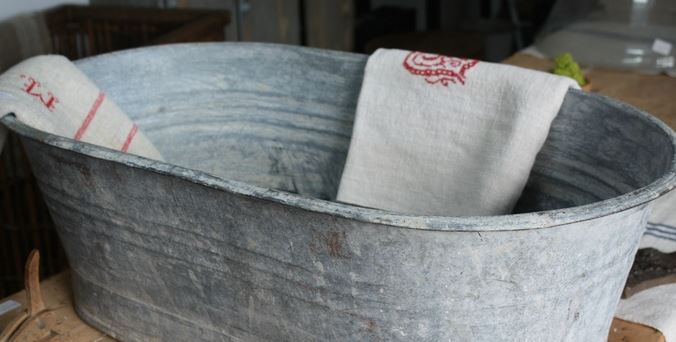Taking a bath was considered a dangerous undertaking in the not so distant past. It was generally believed that, subjected to a prolonged contact with water, body organs would liquefy and therefore a proper rest was needed to restore them to their normal consistency. We all know the good Queen Bess would bathe once a month “whether she needed it or not”. Her contemporary, the French king Henri IV, having summoned his Minister of Finance, and upon learning that the man had just taken a bath, exclaimed: “Then I must go to him for he must not leave his bed!”
Only at the beginning of the 19th century did the idea of taking a regular bath as a part of personal hygiene begin to take shape. It made a slow progress in the upper classes, but the common people remained blissfully dirty. The appearance in the mid-century of moneyed American tourists and their constant complaints about the lack of hygienic facilities accelerated the pace.
 Irvin S. Cobb (1876-1944), the American author, humorist and columnist, was one of the loud critics of European shortcomings in the matter. Having found the British bathroom arrangements lacking in comfort, he endeavored to compare the situation on the Continent. It must be said that none of the countries he visited met with his American standards, but his lashing tongue was especially sharp when describing the French approach to cleanliness:
Irvin S. Cobb (1876-1944), the American author, humorist and columnist, was one of the loud critics of European shortcomings in the matter. Having found the British bathroom arrangements lacking in comfort, he endeavored to compare the situation on the Continent. It must be said that none of the countries he visited met with his American standards, but his lashing tongue was especially sharp when describing the French approach to cleanliness:
I can offer no visual proof to back my word, but by other testimony I venture the assertion that when a boulevardier feels the need of a bath he hangs a musk bag round his neck and then, as the saying is, the warmer the sweeter. His companion of the gentle sex apparently has the same idea of performing daily ablutions that a tabby cat has. You recall the tabby-cat system, do you not? Two swipes over the brow with the moistened paw, one forward swipe over each ear, a kind of circular rubbing effect across the face – and call it a day! Drowning must be the most frightful death that a Parisian sidewalk favorite can die. It is not so much the death itself – it is the attendant circumstances.
Across the river, in the older quarters of Paris, there is excitement when anybody on the block takes a bath – not so much excitement as for fire, perhaps, but more than for a funeral. On the eve of the fatal day the news spreads through the district that tomorrow poor Jacques is going to have a bath! A further reprieve has been denied him. He cannot put it off for another month, or even another two weeks. His doom is nigh at hand; there is no hope – none!
On the morrow the condemned man rises early and sees his spiritual adviser. He eats a hearty breakfast, takes an affectionate leave of his family and says he is prepared for the worst. At the appointed hour the tumbrel enters the street, driven by the paid executioner and bearing the dread instrument of punishment, a large oblong tin tub.
The rumble of the heavy wheels over the cobbles seems to wake an agonized chord in every bosom. Today this dread visitation descends upon Jacques, but who can tell—so the neighbors say to themselves—when the same fate may strike some other household now happily unconscious! All along the narrow way sorrow-drooped heads protrude in rows; from every casement dangle whiskers, lank and stringy in sympathy – for in this section every true Frenchman has whiskers, and if by chance he has not his wife has; so that there are whiskers for all.
From the window of the doomed wretch’s apartments a derrick protrudes – a cross arm with a pulley and a rope attached. It bears a grimly significant resemblance to the gallows tree. Under the direction of the presiding functionary the tub is made fast to the tackle and hoisted upwards as pianos and safes are hoisted in American cities. It halts at the open casement. It vanishes within. The whole place resounds with low murmurs of horror and commiseration.
Ah, the poor Jacques – how he must suffer! Hark to that low, sickening thud! ‘Tis the accursed soap dropping from his nerveless grasp. Hist to that sound – like unto a death rattle! It is the water gurgling in the tub. And what means that low, poignant smothered gasp? It is the last convulsive cry of Jacques descending into the depths. All is over! Let us pray!
The tub, emptied but stained, is lowered to the waiting cart. The executioner kisses the citizen who has held his horse for him during his absence and departs; the whole district still hums with ill-supressed excitement. Questions fly from tongue to tongue. Was the victim brave at the last? Was he resigned when the dread moment came? And how is the family bearing up? It is hours before the place settles down again to that calm which will endure for another month, until somebody else takes a bath on a physician’s prescription.
Even in the sanctity of a Paris hotel a bath is more or less a public function unless you lock your door. All sorts of domestic servitors drift in, filled with morbid curiosity to see how a foreigner deports himself when engaged in this strange, barbaric rite. On the occasion of my first bath on French soil, after several of the hired help had thus called on me informally, causing me to cower low in my porcelain retreat, I took advantage of a comparative quiet to rise drippingly and draw the latch. I judged the proprietor would be along next, and I was not dressed for him.
Related post:









